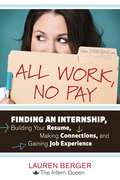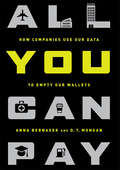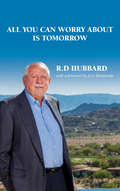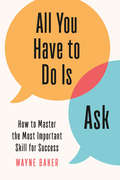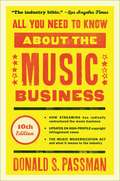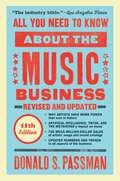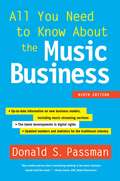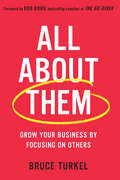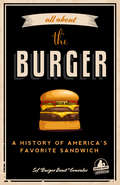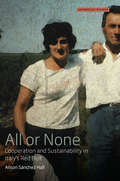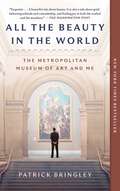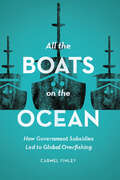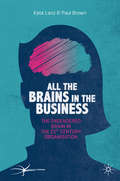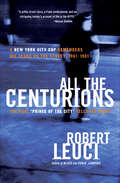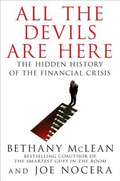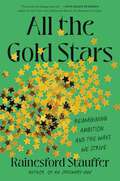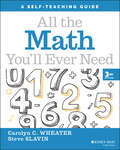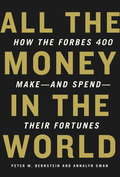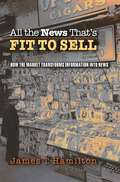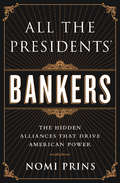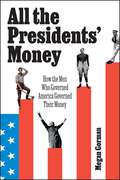- Table View
- List View
All Work, No Pay: Finding an Internship, Building Your Resume, Making Connections, and Gaining Job Experience
by Lauren Berger<p>Land Killer Internships—and Make the Most of Them! <p>These days, a college resume without internship experience is considered “naked.” Indeed, statistics show that internship experience leads to more job offers with highersalaries—and in this tough economy, college grads need all the help they can get. <p>Enter Lauren Berger, internships expert and CEO of Intern Queen, Inc., whose comprehensive guide reveals insider secrets to scoring the perfect internship, building invaluable connections, boosting transferable skills, and ultimately moving toward your dream career. She’ll show you how to: <p> <li>Discover the best internship opportunities, from big companies to virtual internships <li>Write effective resumes and cover letters <li>Nail phone, Skype, and in-person interviews <li>Know your rights as an intern <li>Use social networking to your advantage <li>Network like a pro <li>Impress your boss <li>Get solid letters of recommendation <li>Turn internships into job opportunities</li> <p> <p>With exercises, examples, and a go-getter attitude, this next-generation internship manual provides all the cutting-edge information students and recent grads will need to get a competitive edge in the job market. So what are you waiting for?</p>
All Work, No Play?: Maybe Long Hours Don't Pay
by Jeffrey PfefferContrary to myth and much conventional wisdom, European companies can and do compete successfully in global markets, even with vacation and workweek policies that put their U.S. competitors to shame. This chapter considers whether or not working more hours really pays off.
All You Can Pay: How Companies Use Our Data to Empty Our Wallets
by Anna Bernasek D. T. MonganWhile millions of consumers carry on unaware, powerful companies are racing to gain more knowledge and data than anyone, including any government, has ever had. The goal is to understand consumer behavior and desires, from mundane matters to our most private and intimate affairs. This massive trove of data represents an immense prize for these companies. In economic terms, it is one of the most valuable assets on the planet. In All You Can Pay, Anna Bernasek and D. T. Mongan show how companies use what they know about you to determine how much you are willing to pay for certain products and services. Colleges calculate the price you pay based on the information revealed in the application almost all parents submit for federal aid. Hotels, sports events and health products and services are also using this strategy. The price of everything online-from airline tickets to toilet paper-now fluctuates from moment to moment. Through a toxic combination of price discrimination and cutting-edge technology, sellers can instantly change the price they charge an individual based on their calculations of demand and supply at that point in time. Online stores use your zip code to charge you a different price from someone in another zip code. Bernasek and Mongan offer a dire warning and demonstrate how big data threatens the very icon of the American way: the free market. The ability to understand consumers on a granular level, in real time, and simultaneously to customize the price each person is offered, shifts the balance of power away from the consumer so dramatically that the freedom of markets is at risk. The trend is alarming and, if left unchecked, the destination is clear. Yet consumers and companies can still choose a different path, and in this chilling and illuminating book, Bernasek and Mongan show us how.
All You Can Worry About Is Tomorrow
by R.D. Hubbard&“Part autobiography, part bulleted business advice&” from the legendary entrepreneur, horse racing breeder, and philanthropist (Ruidoso News). &“R.D. Hubbard&’s journey is the embodiment of the American Dream. Born of humble means to great success and all the while tirelessly giving back to the less fortunate to help them reach their dreams.&”—Goldie Hawn, actress, producer & director, founder & board chair, The Hawn Foundation & Mind UP R.D. (Dee) Hubbard has been an inspiration and a beacon for resourceful entrepreneurs for decades. In All You Can Worry About Is Tomorrow, Hubbard shares milestones of his own experience that could help future entrepreneurs. Just a few of the topics he tackles are: How do you size up people and motivate specialized talent?How can entrepreneurs earn trust from financial decision-makers?How do you best apply invaluable customer input to build lasting relationships?How do you master timing . . . in seizing opportunity or deciding to sell?How do you best keep your eye and your energy focused on tomorrow? Dee Hubbard was recognized as a plain-spoken, straight-talking source of invaluable experience and wisdom. His unvarnished inside story reveals how he converted adversity into astonishing opportunity time and again in a colorful and inspiring life. Net author proceeds from the sale of this book are being donated to the scholarship programs of BIGHORN Golf Club Charities, benefiting employees and their families
All You Have to Do Is Ask: How to Master the Most Important Skill for Success
by Wayne BakerA set of tools for mastering the one skill standing between us and success: the ability to ask for the things we need to succeed. Imagine you&’re on a deadline for a big project, and feeling overwhelmed. Or you're looking for a job, but can't seem to get your foot in the door. Or you're dying for tickets to a sold out concert, and all your leads have gone cold. What do these problems have in common? They can all be solved simply by reaching out to a colleague, friend, or wider network and making an ask. Studies show that asking for help makes us better and less frustrated at our jobs. It helps us find new opportunities and new talent. It unlocks new ideas and solutions, and enhances team performance. And it helps us get the things we need outside the workplace as well. And yet, we rarely give ourselves permission to ask. Luckily, the research shows that asking—and getting—what we need is much easier than we tend to think. Here, Wayne Baker shares a set of strategies—used at companies like Google, GM, and IDEO—that individuals, teams, and leaders can use to make asking for help a personal and organizational habit, including: • A quiz to identify your asking-giving style • SMART criteria for who, when, and how to ask • &“Plug-and-play &” routines that make requests a standard component of meetings • Mini-games that incentivize asking within teams • The Reciprocity Ring, a guided activity that allows people to tap into the giving power of a network Picking up where the bestselling book Give and Take left off, All You Have to Do Is Ask shows us how to ignite the cycle of giving and receiving by asking for the things we need.Advance praise for All You Have to Do Is Ask&“Asking for help and support has been a key to my success. Wayne Baker expertly shares how everyone can do it.&”—Shellye Archambeau, former CEO, MetricStream, and board director, Verizon and Nordstrom &“Wayne Baker shares the formula for driving personal, organizational, and social change by tapping the power of our teams and networks for help. This insightful book is a must-read for anyone seeking practical and proven solutions to make our workplaces and world a better place.&”—Noel Tichy, professor, University of Michigan, and author of Judgment and Control Your Destiny or Someone Else Will
All You Need to Know About the Music Business (7th edition)
by Donald S. PassmanThis revised and updated edition provides crucial information on the industry's adaptations to today's technological advances and uncertain economy.
All You Need to Know About the Music Business: 10th Edition
by Donald S. PassmanAll You Need to Know About the Music Business by veteran music lawyer Don Passman—dubbed &“the industry bible&” by the Los Angeles Times—is now updated to address the biggest transformation of the music industry yet: streaming.For more than twenty-five years, All You Need to Know About the Music Business has been universally regarded as the definitive guide to the music industry. Now in its tenth edition, Donald Passman leads novices and experts alike through what has been the most profound change in the music business since the days of wax cylinders and piano rolls. For the first time in history, music is no longer monetized by selling something—it&’s monetized by how many times listeners stream a song. And that completely changes the ecosystem of the business, as Passman explains in detail. Since the advent of file-sharing technology in the late 1990s to the creation of the iPod, the music industry has been teetering on the brink of a major transformation—and with the newest switch to streaming music, this change has finally come to pass. Passman&’s comprehensive guide offers timely, authoritative information from how to select and hire a winning team of advisors and structure their commissions and fees; navigate the ins and outs of record deals, songwriting, publishing, and copyrights; maximize concert, touring, and merchandising deals; and how the game is played in a streaming world. &“If you want to be in music, you have to read this book,&” says Adam Levine, lead singer and guitarist of Maroon 5. With its proven track record, this updated edition of All You Need to Know About the Music Business is more essential than ever for musicians, songwriters, lawyers, agents, promoters, publishers, executives, and managers—anyone trying to navigate the rapid transformation of the industry.
All You Need to Know About the Music Business: Eleventh Edition
by Donald S. PassmanDubbed &“the industry bible&” by the Los Angeles Times, All You Need to Know About the Music Business by veteran music lawyer Donald Passman is the go-to guide for everyone in the music business through ten editions, over thirty years, and over a half a million copies sold. Now with updates explaining why musicians have more power today than ever in history; discussion of the mega-million-dollar sales of artists&’ songs and record catalogs; how artist access to streaming media, and particularly TikTok, has completely reshaped the music business; the latest on music created by AI; and a full update of the latest numbers and trends.For more than thirty years, All You Need to Know About the Music Business has been universally regarded as the definitive guide to the music industry. Now in its eleventh edition, Passman leads novices and experts alike through what has been the most profound change in the music business since the days of wax cylinders and piano rolls: streaming. For the first time in history, music is no longer monetized by selling something—it&’s monetized by how many times a listener streams a song. And also, for the first time, artists can get their music to listeners without a record company gatekeeper, creating a new democracy for music. The &“industry bible&” (Los Angeles Times), now updated, is essential for anyone in the music business—musicians, songwriters, lawyers, agents, promoters, publishers, executives, and managers—and the definitive guide for anyone who wants to be in the business. So, whether you are—or aspire to be—in the music industry, veteran music lawyer Passman&’s comprehensive guide is an indispensable tool. He offers timely information about the latest trends, including the reasons why artists have more clout than ever in history, the massive influence of TikTok, the mega million dollar sales of artists&’ songs and record catalogs, music in Web3 and the Metaverse, music created by AI, and a full update of the latest numbers and practices.
All You Need to Know About the Music Business: Ninth Edition
by Donald S. PassmanThe definitive, essential guide to the music industry, now in its eighth edition--revised and updated with crucial information on the industry's major changes in response to rapid technological advances and economic uncertainty.The past two decades have seen file-sharing technology and digital streaming services transform the music business from top to bottom, and the changes keep coming at breakneck speed. How are record labels adapting to the demand for instantly accessible, low-cost music while coping with piracy? And what does it all mean for aspiring and established artists today? Donald Passman, one of the most trusted music lawyers in the country, offers his sage advice for creating, selling, sharing, and protecting your music in the Information Age in this updated eighth edition of All You Need to Know About the Music Business. Called "the industry bible" by the Los Angeles Times, Passman's comprehensive guide--which has sold hundreds of thousands of copies over the past twenty years--draws on his unparalleled experience and up-to-the-minute knowledge of industry trends. Executives and artists, experts and novices alike, will benefit from Passman's detailed yet easy-to-understand explanations of the latest technology, legalities, and practices shaping the music business, such as: * Royalties for music transmitted via digital down- loads, streaming services, cloud lockers, and apps * Updated licensing regulations and industry agreements * The most recent recording and music publishing deals * The new challenges for performing rights societies He also gives guidance on the basics, such as how to: * Select and hire a winning team of advisors--personal and business managers, agents, and attorneys--and structure their commissions, percentages, and fees in a way that will protect you and maximize these relationships * Master the major and finer points of contract negotiations * Navigate the ins and outs of songwriting and music publishing * Maximize concert, touring, and merchandising agreements Anyone interested in making and marketing music--musicians, songwriters, agents, promoters, publishers, managers, and record company executives--needs this crucial text to keep up with the frenetic pace of technological and legal change. No one understands the music business better than Passman. Let him show you how to "make it" in one of the world's most dynamic and challenging industries.
All Your Worth
by Elizabeth Warren Amelia Warren TyagiYou work hard -- really hard -- but it seems like there's never enough. Never enough to cover all the bills. Never enough to relax and have some fun. Never enough to save some real money. What has gone wrong? What is the secret that you haven't figured out? In All Your Worth, Elizabeth Warren and Amelia Warren Tyagi -- mother/daughter authors of the acclaimed The Two-Income Trap -- tell you the truth about money. They lay out the new rules of money -- the ones nobody talks about. They show you how to get out of debt, cover your bills, and start getting ahead -- without needing to carry a calculator everywhere you go. All Your Worth will help you get control over your money once and for all so that you can finally start building toward the life you've always wanted. All Your Worth isn't based on lucky guesses or gut reasoning; it is the result of more than twenty years of intensive research. As a result, the authors don't offer you a few quick fixes destined to fall apart, and they don't waste time trying to solve problems you don't have. Instead, the authors lay out a breakthrough approach for getting control over your money. And they use this approach to help you conquer your financial problems, step by step. They help you create a plan that isn't just for a week or for a month; this is a plan that lets you master your money for the rest of your life. The secret? It's simple, really: Get your money in balance. Warren and Tyagi show you how to divide and conquer. You will learn to balance your money into three essential parts: the Must-Haves (the bills you have to pay month after month), the Wants (some fun money for right now), and your Savings (so you can build a better tomorrow). No complicated budgets, and no keeping track of every penny you spend. Once you have the basics, it gets easy. You can put your money worries behind you and get on with what really matters -- living your life. Whatever your struggles with money, Warren and Tyagi can help you get your finances on the right track. They will show you things about yourself that you have never quite seen. Are you an emotional spender? Is debt robbing your future? Do you spend too little on fun? Are you and your partner trapped in the Money Blame Game? After you read this book, you will never look at your money -- or yourself -- in quite the same way again. Whether you are knee-deep in past-due notices or you just don't think you're saving enough, money worries can chew away at your life. Warren and Tyagi are here to tell you that you can stop the worry. You can change it all. You can have enough -- enough to cover the necessities, enough to put some real money in the bank and start bringing your dreams into reach. You can even have enough money to have fun. (In fact, they insist that you have enough for fun!) Best of all, with All Your Worth, you can have peace of mind for the rest of your life.
All about Them: Grow Your Business by Focusing on Others
by Bob Burg Bruce TurkelThe best companies and most successful salespeople live by a three-word mantra—"all about them"—because when they relentlessly focus their brand on their customers instead of themselves, their businesses flourish. All about Them shows readers how to use this simple but extremely powerful influencing technique. Bruce Turkel, who has advised some of the world's greatest companies, including American Express and Bacardi, lays the groundwork by relating his personal journey of discovery to the "All about Them" principle. He goes on to explore our technology-driven, hyper- connected culture; the power of storytelling (and story-selling); brand authenticity and transparency; and more.
All about the Burger: A History of America's Favorite Sandwich
by Sef GonzalezFrom conception to perfection, a complete history of the hamburger, for fans of Mark Kurlansky, Tom Standage, Jared Diamond, and Bee Wilson. Discover the food history you've been missing in this entertaining book. Do you know what the first burger chain was? That Taco Bell was originally known as Bell Burger—and was founded in the same city as McDonald's? Have you heard of the 1980s Burger Wars? All About the Burger covers all these topics and more…All About the Burger will take you on the burger journey of a lifetime, an informational magic carpet ride. You&’ll learn about restaurants, cooking styles, and different eras that have made the burger the juggernaut that it is. From White Castle to Shake Shack, from simple sandwich to specialty burger, you won&’t miss a bite. This is the definitive Bible of Burgers. After reading this book, you will learn:· The contributions burgers have made to food culture· The evolution of the burger from carnival treat to an American staple· Where to go to find your next favorite burger· And much more!Praise for All about the Burger &“Sef&’s pursuit of the real story, along with the way he writes about the histories of these storied American restaurants and companies, truly conveys the respect and love he has for the subject.&”―Bob Gatewood and Brian Easley, president & vice president at Druther&’s &“A book so meticulously researched and passionately written, it is the crowning achievement of one of our greatest food authorities. You will devour it instantly.&”―Lee Schrager, Food Network&’s South Beach Wine & Food Festival, founder
All or None: Cooperation and Sustainability in Italy's Red Belt (Anthropology of Europe #3)
by Alison Sánchez HallAt once a social history and anthropological study of the world’s oldest voluntary collective farms, All or None is a story of how landless laborers joined together in Ravenna, Italy to acquire land, sometimes by occupying private land in what they called a “strike in reverse,” and how they developed sophisticated land use plans, based not only on the goal of profit, but on the human value of providing work where none was available. It addresses the question of the viability of cooperative enterprise as a potential solution for displaced workers, and as a more humane alternative to capitalist agribusiness.
All the Beauty in the World: The Metropolitan Museum of Art and Me
by Patrick BringleyA best book of the year from New York Public Library, NPR, the Financial Times, Book Riot, and the Sunday Times (London). A fascinating, revelatory portrait of the Metropolitan Museum of Art and its treasures by a former New Yorker staffer who spent a decade as a museum guard.Millions of people climb the grand marble staircase to visit the Metropolitan Museum of Art every year. But only a select few have unrestricted access to every nook and cranny. They&’re the guards who roam unobtrusively in dark blue suits, keeping a watchful eye on the two million square foot treasure house. Caught up in his glamorous fledgling career at The New Yorker, Patrick Bringley never thought he&’d be one of them. Then his older brother was diagnosed with fatal cancer and he found himself needing to escape the mundane clamor of daily life. So he quit The New Yorker and sought solace in the most beautiful place he knew. To his surprise and the reader&’s delight, this temporary refuge becomes Bringley&’s home away from home for a decade. We follow him as he guards delicate treasures from Egypt to Rome, strolls the labyrinths beneath the galleries, wears out nine pairs of company shoes, and marvels at the beautiful works in his care. Bringley enters the museum as a ghost, silent and almost invisible, but soon finds his voice and his tribe: the artworks and their creators and the lively subculture of museum guards—a gorgeous mosaic of artists, musicians, blue-collar stalwarts, immigrants, cutups, and dreamers. As his bonds with his colleagues and the art grow, he comes to understand how fortunate he is to be walled off in this little world, and how much it resembles the best aspects of the larger world to which he gradually, gratefully returns. In the tradition of classic workplace memoirs like Lab Girl and Working Stiff, All The Beauty in the World is a surprising, inspiring portrait of a great museum, its hidden treasures, and the people who make it tick, by one of its most intimate observers.
All the Boats on the Ocean: How Government Subsidies Led to Global Overfishing
by Carmel FinleyMost current fishing practices are neither economically nor biologically sustainable. Every year, the world spends $80 billion buying fish that cost $105 billion to catch, even as heavy fishing places growing pressure on stocks that are already struggling with warmer, more acidic oceans. How have we developed an industry that is so wasteful, and why has it been so difficult to alter the trajectory toward species extinction? In this transnational, interdisciplinary history, Carmel Finley answers these questions and more as she explores how government subsidies propelled the expansion of fishing from a coastal, in-shore activity into a global industry. While nation states struggling for ocean supremacy have long used fishing as an imperial strategy, the Cold War brought a new emphasis: fishing became a means for nations to make distinct territorial claims. A network of trade policies and tariffs allowed cod from Iceland and tuna canned in Japan into the American market, destabilizing fisheries in New England and Southern California. With the subsequent establishment of tuna canneries in American Samoa and Puerto Rico, Japanese and American tuna boats moved from the Pacific into the Atlantic and Indian Oceans after bluefin. At the same time, government subsidies in nations such as Spain and the Soviet Union fueled fishery expansion on an industrial scale, with the Soviet fleet utterly depleting the stock of rosefish (or Pacific ocean perch) and other groundfish from British Columbia to California. This massive global explosion in fishing power led nations to expand their territorial limits in the 1970s, forever changing the seas. Looking across politics, economics, and biology, All the Boats on the Ocean casts a wide net to reveal how the subsidy-driven expansion of fisheries in the Pacific during the Cold War led to the growth of fisheries science and the creation of international fisheries management. Nevertheless, the seas are far from calm: in a world where this technologically advanced industry has enabled nations to colonize the oceans, fish literally have no place left to hide, and the future of the seas and their fish stocks is uncertain.
All the Brains in the Business: The Engendered Brain in the 21st Century Organisation (The Neuroscience of Business)
by Paul Brown Kate LanzThe power of gender difference, not gender equality, is a secret source for success. Some smart businesses are starting to wake up to this fact. This book explores why and how. Properly valuing brain gender diversity in the workplace is one of the biggest and largely untapped sources of competitive advantage for modern businesses. Recent advances in neuroscience provide the key to unlocking it. Modern research shows that there are gender-based differences in the brain – it’s just not as simple as a binary between a ‘male brain’ and ‘female brain’. In fact, our brains are like a mosaic where many of the tiles are available in thousands of shades on a spectrum between pink and blue. The problem is that our workplaces tend to be governed by structures, processes and cultures that are practically pure blue. All the brains in the business that are elsewhere on the spectrum cannot thrive as they might, so sources of productivity, creativity and agility go untapped. Anyone who manages people needs to understand how the brain works and the impact it has on how people work together as teams. Anyone who wants to unlock the talent and productivity of all of their people needs to understand how recent findings around male- and female-type brains should shape the way they manage. Leading applied neuroscientists and international corporate coaches Kate Lanz and Paul Brown show you why and how to access all the brains in your business.
All the Centurions: The Real "Prince of the City" Tells His Story
by Robert LeuciThe bestselling book and acclaimed film Prince of the City told only part of Robert Leuci's story. In All the Centurions, he shares the full account of his years as a narcotics detective with the New York Police Department -- a tale of daring adventure, shattered illusions, and finally, astonishing spiritual growth.Leuci reminisces about cops both celebrated and notorious, like Frank Serpico, Sonny Grosso, and Frank King from the French Connection case. Also here are politicians, Mafia figures, corrupt defense lawyers, and district attorneys, including a young Rudolph Giuliani. Leuci reveals the dark side of the criminal justice system: the bitterness, greed, cruelty, and ambition that eventually overflowed into the streets, precinct houses, and courtrooms of the city.As vivid and entertaining as the best crime novels, All the Centurions is the story of a man descending into a hell of his own making who ultimately finds his way out through truth and justice.
All the Devils Are Here: The Hidden History of the Financial Crisis
by Bethany Mclean Joe NoceraAs soon as the financial crisis erupted, the finger-pointing began. Should the blame fall on Wall Street, Main Street, or Pennsylvania Avenue? On greedy traders, misguided regulators, sleazy subprime companies, cowardly legislators, or clueless home buyers?<P><P> According to Bethany McLean and Joe Nocera, two of America's most acclaimed business journalists, the real answer is all of the above-and more. Many devils helped bring hell to the economy. And the full story, in all of its complexity and detail, is like the legend of the blind men and the elephant. Almost everyone has missed the big picture. Almost no one has put all the pieces together.<P> All the Devils Are Here goes back several decades to weave the hidden history of the financial crisis in a way no previous book has done. It explores the motivations of everyone from famous CEOs, cabinet secretaries, and politicians to anonymous lenders, borrowers, analysts, and Wall Street traders. It delves into the powerful American mythology of homeownership. And it proves that the crisis ultimately wasn't about finance at all; it was about human nature.<P> Among the devils you'll meet in vivid detail:<P> * Angelo Mozilo, the CEO of Countrywide, who dreamed of spreading homeownership to the masses, only to succumb to the peer pressure-and the outsized profits-of the sleaziest subprime lending.<P> * Roland Arnall, a respected philanthropist and diplomat, who made his fortune building Ameriquest, a subprime lending empire that relied on blatantly deceptive lending practices.<P> * Hank Greenberg, who built AIG into a Rube Goldberg contraption with an undeserved triple-A rating, and who ran it so tightly that he was the only one who knew where all the bodies were buried.<P> * Stan O'Neal of Merrill Lynch, aloof and suspicious, who suffered from "Goldman envy" and drove a proud old firm into the ground by promoting cronies and pushing out his smartest lieutenants.<P> * Lloyd Blankfein, who helped turn Goldman Sachs from a culture that famously put clients first to one that made clients secondary to its own bottom line.<P> * Franklin Raines of Fannie Mae, who (like his predecessors) bullied regulators into submission and let his firm drift away from its original, noble mission.<P> * Brian Clarkson of Moody's, who aggressively pushed to increase his rating agency's market share and stock price, at the cost of its integrity.<P> * Alan Greenspan, the legendary maestro of the Federal Reserve, who ignored the evidence of a growing housing bubble and turned a blind eye to the lending practices that ultimately brought down Wall Street-and inflicted enormous pain on the country.<P> Just as McLean's The Smartest Guys in the Room was hailed as the best Enron book on a crowded shelf, so will All the Devils Are Here be remembered for finally making sense of the meltdown and its consequences.
All the Devils Are Here: The Hidden History of the Financial Crisis
by Bethany Mclean Joe Nocera"Hell is empty, and all the devils are here." -Shakespeare, The TempestAs soon as the financial crisis erupted, the finger-pointing began. Should the blame fall on Wall Street, Main Street, or Pennsylvania Avenue? On greedy traders, misguided regulators, sleazy subprime companies, cowardly legislators, or clueless home buyers?According to Bethany McLean and Joe Nocera, two of America's most acclaimed business journalists, the real answer is all of the above-and more. Many devils helped bring hell to the economy. And the full story, in all of its complexity and detail, is like the legend of the blind men and the elephant. Almost everyone has missed the big picture. Almost no one has put all the pieces together.All the Devils Are Here goes back several decades to weave the hidden history of the financial crisis in a way no previous book has done. It explores the motivations of everyone from famous CEOs, cabinet secretaries, and politicians to anonymous lenders, borrowers, analysts, and Wall Street traders. It delves into the powerful American mythology of homeownership. And it proves that the crisis ultimately wasn't about finance at all; it was about human nature.Among the devils you'll meet in vivid detail:* Angelo Mozilo, the CEO of Countrywide, who dreamed of spreading homeownership to the masses, only to succumb to the peer pressure-and the outsized profits-of the sleaziest subprime lending.* Roland Arnall, a respected philanthropist and diplomat, who made his fortune building Ameriquest, a subprime lending empire that relied on blatantly deceptive lending practices.* Hank Greenberg, who built AIG into a Rube Goldberg contraption with an undeserved triple-A rating, and who ran it so tightly that he was the only one who knew where all the bodies were buried.* Stan O'Neal of Merrill Lynch, aloof and suspicious, who suffered from "Goldman envy" and drove a proud old firm into the ground by promoting cronies and pushing out his smartest lieutenants.* Lloyd Blankfein, who helped turn Goldman Sachs from a culture that famously put clients first to one that made clients secondary to its own bottom line.* Franklin Raines of Fannie Mae, who (like his predecessors) bullied regulators into submission and let his firm drift away from its original, noble mission.* Brian Clarkson of Moody's, who aggressively pushed to increase his rating agency's market share and stock price, at the cost of its integrity.* Alan Greenspan, the legendary maestro of the Federal Reserve, who ignored the evidence of a growing housing bubble and turned a blind eye to the lending practices that ultimately brought down Wall Street-and inflicted enormous pain on the country.Just as McLean's The Smartest Guys in the Room was hailed as the best Enron book on a crowded shelf, so will All the Devils Are Here be remembered for finally making sense of the meltdown and its consequences.
All the Gold Stars: Reimagining Ambition and the Ways We Strive
by Rainesford StaufferFrom journalist and author of An Ordinary Age, an examination, dismantling, and reconstruction of ambition, where burnout is the symptom of our holiest sin: the lonely way we strive. Ambition—the want, the hunger, the need to achieve—is woven into America&’s fabric from the first colonization to capitalism. From our first gold star assignment to acceptance at the &“right&” college to hustle and grinding our lives, we celebrate our drive, even as we gatekeep who is permitted to strive--and how visibly. Even as we burn out. When we can&’t even. When we know: work won&’t love us back.All the Gold Stars looks at how the cultural, personal, and societal expectations around ambition are driving the burnout epidemic by funneling our worth into productivity, limiting our imaginations, and pushing us further apart. Through the devastating personal narrative of her own ambition crisis, Stauffer discovers the common factors driving us all, peeling back layers of family expectations, capitalism, and self-esteem that dangerously tie up our worth in our output. Interviews with students, parents, workers, psychologists, labor organizers, and more offer a new definition of ambition and the tools to reframe our lives around true success. All the Gold Stars provides ways for us to reject our current reality and reconceive ambition as more collective, imaginative, and rooted in caring for ourselves and each other.
All the Math You'll Ever Need: A Self-Teaching Guide (Wiley Self-Teaching Guides #148)
by Carolyn C. Wheater Steve SlavinA comprehensive and hands-on guide to crucial math concepts and terminology In the newly revised third edition of All the Math You’ll Ever Need: A Self-Teaching Guide, veteran math and computer technology teacher Carolyn Wheater and veteran mathematics author Steve Slavin deliver a practical and accessible guide to math you can use every day and apply to a wide variety of life tasks. From calculating monthly mortgage payments to the time you’ll need to pay off a credit card, this book walks you through the steps to understanding basic math concepts. This latest edition is updated to reflect recent changes in interest rates, prices, and wages, and incorporates information on the intelligent and efficient use of calculators and mental math techniques. It also offers: A brand-new chapter on hands-on statistics to help readers understand common graphs An easy-to-use-format that provides an interactive method with frequent questions, problems, and self-tests Complete explanations of necessary mathematical concepts that explore not just how math works, but also why it worksPerfect for anyone seeking to make practical use of essential math concepts and strategies in their day-to-day life, All the Math You’ll Ever Need is an invaluable addition to the libraries of students who want a bit of extra help applying math in the real world.
All the Money in the World: How the Forbes 400 Make--and Spend--their Fortunes
by Annalyn Swan Peter W. BernsteinPublished to coincide with the twenty-fifth anniversary of the Forbes 400, All the Money in the World,the work of a team of prominent editors and business writers, goes behind the celebrated list to paint a vivid and revealing portrait of the wealthiest Americans of the past quarter century. Abundantly anecdotal, with insights gleaned from original research, interviews with Forbes 400 members, and never-before-compiled data, it is filled with illuminating "infographics"--tables, sidebars, factoids. The book shows how the superrich succeed, how fortunes are made in various industries, and how, once made, they are saved, enhanced, and sometimes squandered. From Wall Street to the West Coast, from blue-collar billionaires to blue-blood fortunes, from the Google guys to hedge fund honchos, All the Money in the World gives us the lowdown on, among other things: the all-time richest Americans, who made and lost the most money in the past twenty-five years, the fields and industries that have produced the greatest wealth, the biggest risk takers, the most competitive players, the most wasteful family feuds, the trophy wives, the most conspicuous consumers, the biggest art collectors, the most and least generous philanthropists. Produced in collaboration with Forbes magazine,All the Money in the World is a vastly entertaining, behind-the-scenes look at today's Big Rich, a subject of enduring fascination to all Americans.
All the News That's Fit to Sell: How the Market Transforms Information into News
by James T. HamiltonThat market forces drive the news is not news. Whether a story appears in print, on television, or on the Internet depends on who is interested, its value to advertisers, the costs of assembling the details, and competitors' products. But in All the News That's Fit to Sell, economist James Hamilton shows just how this happens. Furthermore, many complaints about journalism--media bias, soft news, and pundits as celebrities--arise from the impact of this economic logic on news judgments. This is the first book to develop an economic theory of news, analyze evidence across a wide range of media markets on how incentives affect news content, and offer policy conclusions. Media bias, for instance, was long a staple of the news. Hamilton's analysis of newspapers from 1870 to 1900 reveals how nonpartisan reporting became the norm. A hundred years later, some partisan elements reemerged as, for example, evening news broadcasts tried to retain young female viewers with stories aimed at their (Democratic) political interests. Examination of story selection on the network evening news programs from 1969 to 1998 shows how cable competition, deregulation, and ownership changes encouraged a shift from hard news about politics toward more soft news about entertainers. Hamilton concludes by calling for lower costs of access to government information, a greater role for nonprofits in funding journalism, the development of norms that stress hard news reporting, and the defining of digital and Internet property rights to encourage the flow of news. Ultimately, this book shows that by more fully understanding the economics behind the news, we will be better positioned to ensure that the news serves the public good.
All the Presidents' Bankers: The Hidden Alliances That Drive American Power
by Nomi PrinsWho rules America?All the Presidents' Bankers is a groundbreaking narrative of how an elite group of men transformed the American economy and government, dictated foreign and domestic policy, and shaped world history.Culled from original presidential archival documents, All the Presidents' Bankers delivers an explosive account of the hundred-year interdependence between the White House and Wall Street that transcends a simple analysis of money driving politics-or greed driving bankers.Prins ushers us into the intimate world of exclusive clubs, vacation spots, and Ivy League universities that binds presidents and financiers. She unravels the multi-generational blood, intermarriage, and protégé relationships that have confined national influence to a privileged cluster of people. These families and individuals recycle their power through elected office and private channels in Washington, DC.All the Presidents' Bankers sheds new light on pivotal historic events-such as why, after the Panic of 1907, America's dominant bankers convened to fashion the Federal Reserve System; how J. P. Morgan's ambitions motivated President Wilson during World War I; how Chase and National City Bank chairmen worked secretly with President Roosevelt to rescue capitalism during the Great Depression while J.P. Morgan Jr. invited Roosevelt's son yachting; and how American financiers collaborated with President Truman to construct the World Bank and IMF after World War II.Prins divulges how, through the Cold War and Vietnam era, presidents and bankers pushed America's superpower status and expansion abroad, while promoting broadly democratic values and social welfare at home. But from the 1970s, Wall Street's rush to secure Middle East oil profits altered the nature of political-financial alliances. Bankers' profit motive trumped heritage and allegiance to public service, while presidents lost control over the economy-as was dramatically evident in the financial crisis of 2008.This unprecedented history of American power illuminates how the same financiers retained their authoritative position through history, swaying presidents regardless of party affiliation. All the Presidents' Bankers explores the alarming global repercussions of a system lacking barriers between public office and private power. Prins leaves us with an ominous choice: either we break the alliances of the power elite, or they will break us.
All the Presidents' Money: How the Men Who Governed America Governed Their Money
by Megan GormanA journey through the personal money stories of the US presidents and how they built wealth—or didn&’t.Was Harry Truman really our poorest president or simply a man up at 2 a.m. struggling with financial anxiety? Did Calvin Coolidge get bad advice from his stockbroker to buy stocks in 1930 as the market continued to crash? Is it true George Washington enhanced his net worth by marrying up? We often think of the US presidents as being above the fray. But the truth is, the presidents are just like us—worried about money, trying to keep a budget, and chasing the American financial dream. While some presidents like Herbert Hoover and Gerald Ford became wildly successful with money, others like Thomas Jefferson and Joe Biden struggled to sustain their lifestyle. The ability to win the presidency is no guarantee of financial security, although today it&’s a much easier path to monetize. In All the Presidents&’ Money, tax attorney and wealth manager Megan Gorman takes us on a journey to understand the different personal money stories of the presidents. Grit, education, and risk are just some of the different ways that the presidents over the last 250 years have made (or lost) money. With lively storytelling and rigorous research, All the Presidents&’ Money reveals how some of the greatest leaders are the worst money managers and our least favorite presidents are good at making money.
